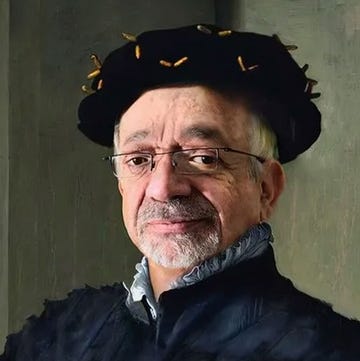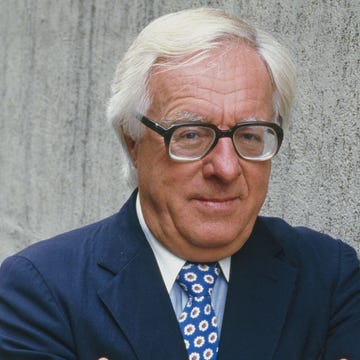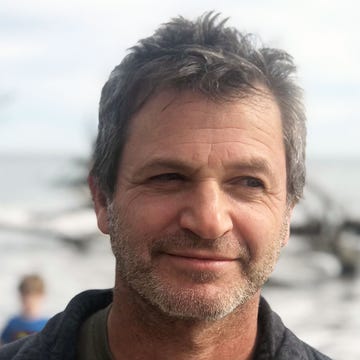In most stories of the well-trodden American journey west, travelers are propelled there for gold and other riches, land and opportunity, a sense of freedom or spiritual transcendence, or simply abandon and adventure. But what if you’re in search of something more amorphous? What if what you’re seeking isn’t a gain of some sort but rather what has been irretrievably lost?
In her memoir, Greyhound, U.K.-based Irish Canadian writer Joanna Pocock is after just that: It’s a desire for a distinct lack of arrival that pushes forward her narrative. Pocock’s second book, Greyhound is explicitly in conversation with the canonized accounts of what she calls the “Great American Road Trip.” This literature, and a reading streak spurred by the travel restrictions of the COVID-19 pandemic, are two of the many reasons she’s undertaking her own trips. But Pocock is attempting something different from the familiar narratives, and she achieves that objective with subtle sophistication.
Her mission is twofold—or perhaps it’s more apt to say that there are two Pococks at play here. Greyhound finds Pocock both in 2006 and in 2023: The memoir is an account of her traveling the same cross-country journey she took 17 years before, when, experiencing two profound personal losses, she set off via Greyhound bus from Detroit to Los Angeles. In 2023, the journey is, of course, marked by the inevitable transformations in landscape, culture, technology, and the cast of characters she encounters. But as the story—and the vehicle that houses it—rolls along, moving forward (i.e., westward) across space but back and forth through the two alternating moments in time, we find Pocock’s motivation to retrace this journey shifting alongside the changing landscape.
The purposes of her original journey are somewhat straightforward: Pocock describes herself, in 2006, as “a ragged person running away from loss” after the death of her beloved sister, coupled with her own third miscarriage. When she decides to retrace this particular journey 17 years later, however, she’s on a different kind of “pilgrimage”: “I was curious to see how the places I had travelled through in 2006 had changed, while simultaneously catching a glimpse of the person I had been then.” This self-reflection and desire for change came about during the pandemic, when she imagined herself in another kind of confinement: within a Greyhound bus.
But the vision of America she’s presented with, through the smeared bus window, is much grimmer than during her previous journey. The only solace left for her to find is in the existence of the Greyhound itself—meanwhile, the infrastructure around it has utterly collapsed. At all turns, Pocock finds drivers quitting on the job, hours-long delays, vacant stations and nonexistent bus stops, and the failing red tape holding the obsolescent network together (on her ride from Tulsa, Oklahoma, to Amarillo, Texas, an eavesdropped conversation between “two Greyhound drivers talking shop” reveals that even the employees are frustrated by the shoddy system).
As the journey unfolds, and the stark reality of America reveals itself, Pocock’s morale falters, but her dedication to an alternative way of being begins to take shape. And while she doesn’t go on her Great American Road Trip to demonstrate proof of any sort of “machismo” or “individualism” (she accuses other writers of the genre, such as Steinbeck, of this), she seems to be collecting another kind of evidence: that the Greyhound offers an ideal, a model of community, ecological concern, and care.
Her lifelong, unabashed “mistrust of Big Oil and the car industry,” confirmed by the suffering and desolation she sees from her bus seat, transforms the memoir into both a manifesto and a eulogy for this mode of transport. Pocock’s interested in what the Greyhound can represent in a time of increasing digitization and, therefore, isolation. This “relocation of human transactions and experiences to the digital sphere” appears as one, if not the central, source of the crisis to which she bears witness. On more than one occasion, a passenger is barred bus access owing to a lost phone that holds their ticket; she realizes that “every payphone in every Greyhound station has now been ripped from the walls.” And the sheer scale of the despair she observes begins to overcome her tenuous reasons for embarking on this 2023 journey. “In retrospect,” she writes, “I was so shocked by the state of the people among whom I was travelling that any search I thought I was undertaking was subsumed by the existence of so much suffering around me.” In this way, her private grief in 2006 is eclipsed by the losses she sees in 2023 while coming across more “people who seemed shocked into silent desperation than I had ever seen in my life.”
Pocock recognizes that maybe a Greyhound never meant freedom for everyone, as it does for her: “I had realized that my journey of choice and escape was not the same journey that so many of these passengers were on.” But where she found “camaraderie” in this shared experience before “reality…moved into the digital realm,” in 2023, she is appalled by its absence. And thus, the book’s final, essential plea—to recognize what the Greyhound, for all these reasons, can uniquely offer—is ambitious and earnest. In this westward journey, Pocock seeks not fortune, success, or survival, but connection, in all senses of the word: for her own sake but also, more urgently, as a balm for America’s pervasive ills to which her bus ride grants her a front-row seat.•
Maisie Hurwitz is a freelance contributor to Alta Journal living in Los Angeles. She is a recent graduate of Wesleyan University, where she received her bachelor's degree in English and creative writing.













